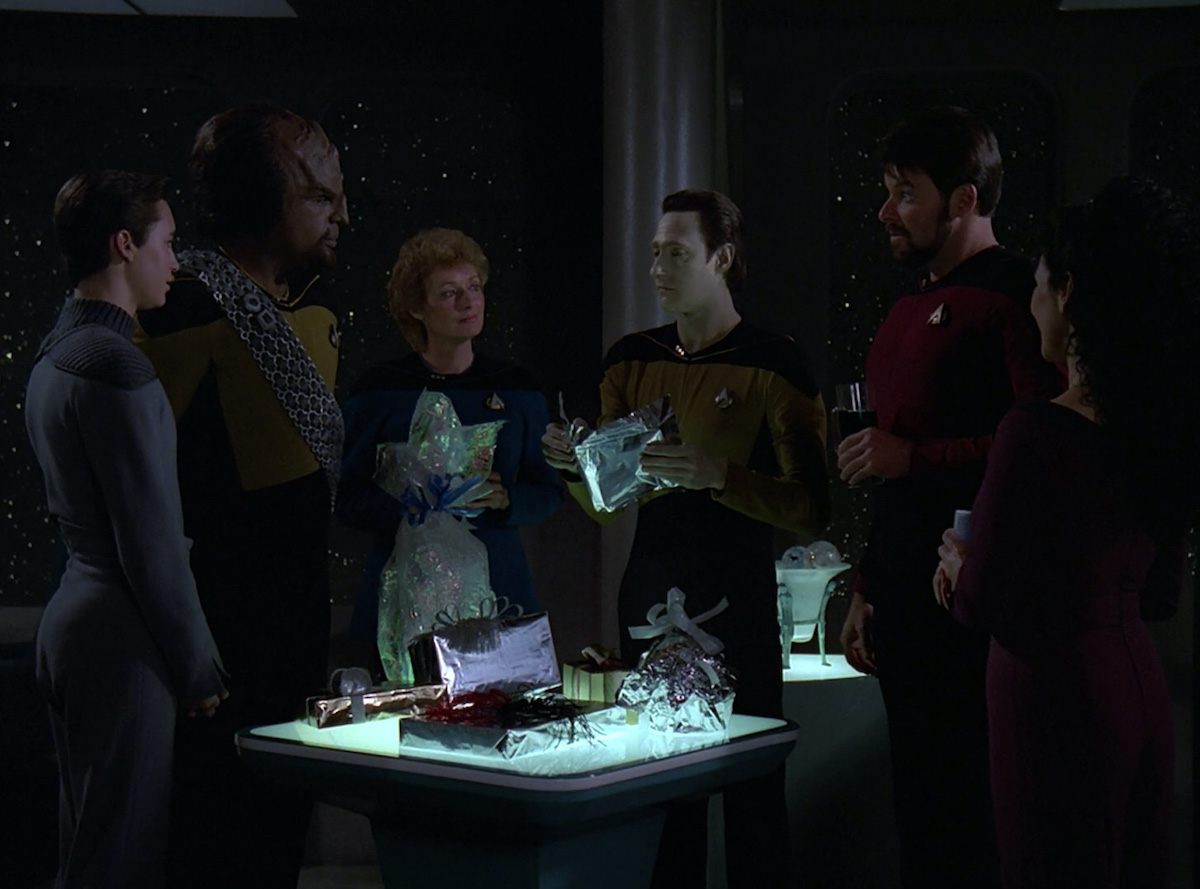“From limitless options, I am reduced to none. Or rather one.”
I don’t normally go in for extended cut / deleted scene shenanigans, particularly on things I hold sacrosanct, but the opportunity to see a full cut of “The Measure of a Man” that is well over a third longer than the broadcast version was just too tempting to resist. It was nearly, though not quite, like watching a new episode of Star Trek: The Next Generation, which, circa 1994 or thereabouts, I was quite convinced I’d never do again.
“The Measure of a Man” is certainly not an episode in need of enhancement, and in truth, the majority of the material that was left on the cutting room floor was justifiably excised. A lot of points are needlessly double-tapped in the long cut, when they only require a single mention. To my surprise, the thematic throughline comes away weakened as well – the question of whether or not Data is a sentient being seems more meandering and haphazard in the extended version, versus the tight, convincing essay that the final episode delivers. Nonetheless, there are some pretty amazing moments. The most startling of all is Data himself rejecting Picard’s claim that an android could be sentient. There is also a coda to Data’s going-away party in Ten Forward, where Commander Maddox shows up to taunt Data in front of his friends, that comes off like a punch across the jaw. Late in the episode, Data calls Riker “Will” for the first and only time – the only excision in the longer cut whose absence in the televised version might genuinely be called a shame.
In its original form, “The Measure of a Man” is a terrific episode of television. It demonstrates the immense range of potential that Star Trek: The Next Generation has arrived at by this point; the episode is essentially a courtroom drama, the 1988 equivalent of Lincoln in that it’s only really about the creation of law via adversarial jurisprudence, and takes place entirely in rooms, with men and women talking to one another. (One more deleted bit is interesting enough: Troi admitting the possibility that, for all her desire to think otherwise, the Enterprise crew might be anthropomorphizing Data, thanks to the intense sophistication of his programmed personality.)
The courtroom scene(s) that make up most of the final third of the show must be among the best-written and performed in the whole run of the series – in fact, in the whole run of the Star Trek franchise itself. Screenwriter Melinda Snodgrass scripted an intensely intelligent debate, broken into powerful dramatic chunks. (As I recall, I clobbered a few opponents in school debates the following term, based solely on aping Riker and Picard’s examples.) A question to Bruce Maddox, though: if he contends that Data is Starfleet’s property, when did that status begin? How can any “thing,” sentient or not, possess the agency to volunteer for Starfleet, but retain no right to leave?
I realize now that I also learned how to play poker from Star Trek: The Next Generation, and the series’ long-standing runner (the poker game in Riker’s quarters) gets its start here, in a friendly game between Riker, Pulaski, Geordi, O’Brien, and Data; it is the latter’s first game ever, and he gets slaughtered. (“Time to pluck a pigeon!” O’Brien memorably intones.) There is also a great sequence of Data packing up his quarters when he has decided to resign from Starfleet, revealing the portable hologram he keeps of Tasha Yar. Later in the episode, upon Data’s admission of his and Tasha’s sexual history, a reaction closeup from Riker resounds with memory and loss.
But the best scene in the episode comes as an entr’acte between Riker and Picard’s arguments in Captain Louvois’ courtroom, as Picard seeks solace and counsel from Guinan in Ten Forward. Any doubts about Whoopi Goldberg’s value as an addition to the cast are put paid in this startling scene, where she connects all the dots of every conversation in the episode thus far and arrives at the ghost of slavery – calmly, casually conjured up by a single-scene performance by a great actress. “The Measure of a Man” is on the nose about many things, but more often possesses a subtlety and patience in its thematic outlay that episodes of Star Trek rarely, if ever, convey. This remains great television.

Blogging The Next Generation runs every Tuesday as I work my way through every episode of Star Trek: The Next Generation on blu-ray. Season 2 is available now. I’m double-timing it this week, to sync up for Season 3’s launch in April.
